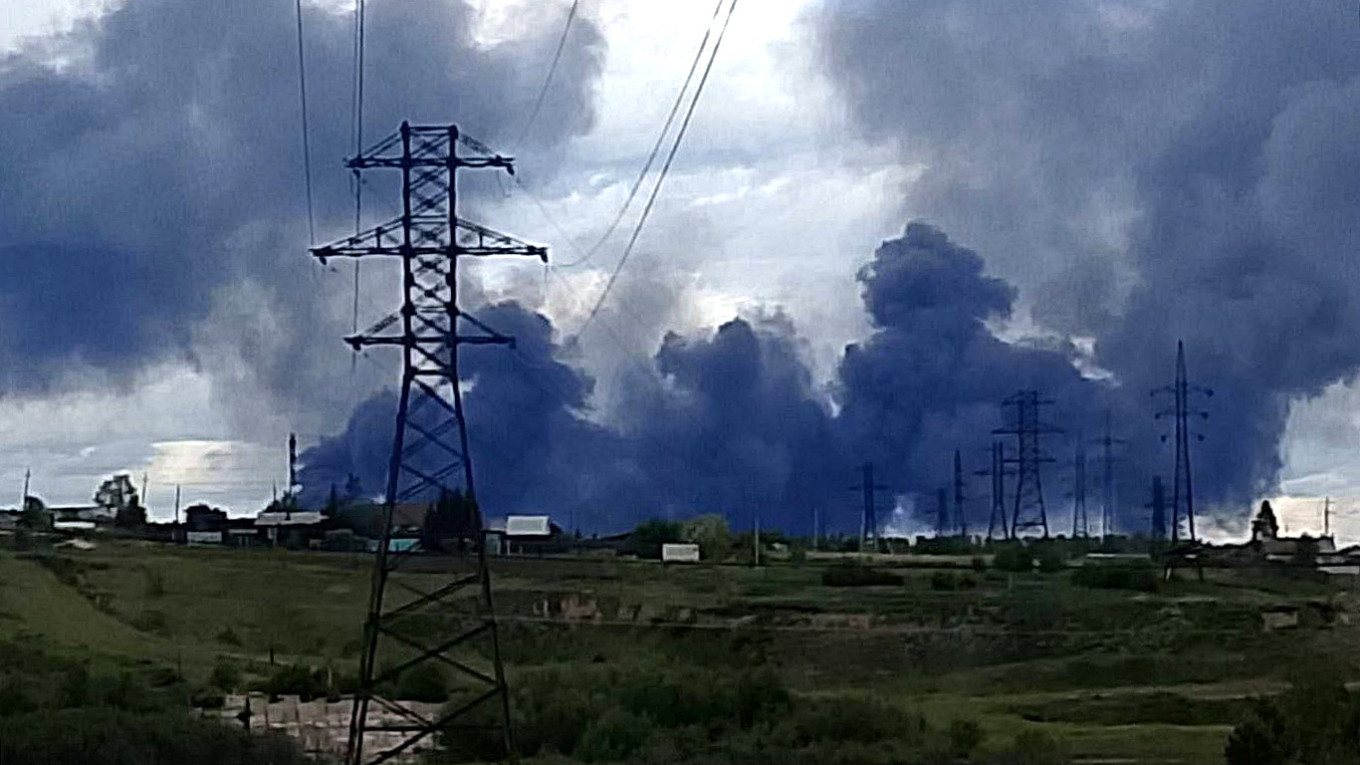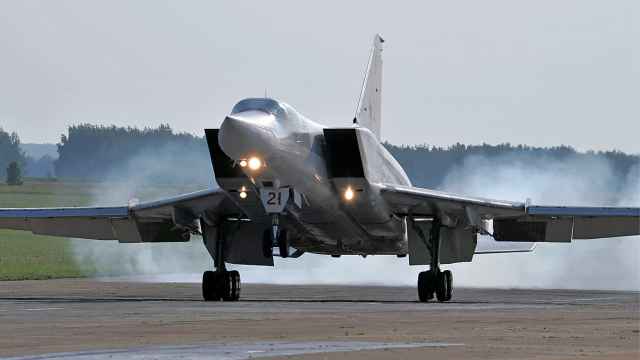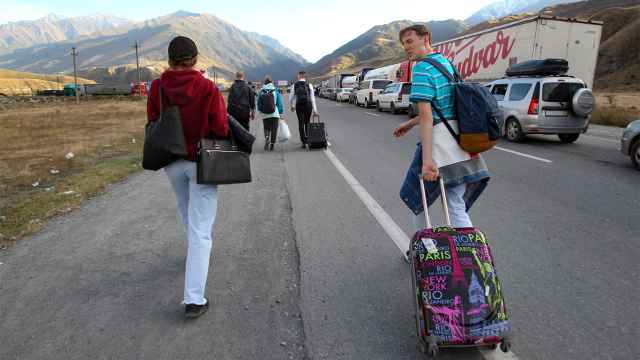In his classic book "Catch-22," Joseph Heller coined the maxim, "Just because you’re paranoid doesn't mean they aren’t after you." The phrase acknowledges the difference, but also the occasional overlap, between perception and reality, fear and fearsomeness, manufactured threat and genuine menace.
The Russian leadership, led by President Vladimir Putin and instrumentalized by the Federal Security Service, has fostered a societal paranoia of spies, saboteurs, terrorists and "foreign agents." That paranoia is useful for maintaining the patriotic fervor that the government requires to keep the Russian people aligned behind the war in Ukraine.
Institutional paranoia is part of the Russian government’s philosophy that political unity is strength while political division is weakness. If leaders can maintain unity of mind and purpose amongst the Russian population, especially concerning Ukraine, then Russia appears strong, and appearing strong is the objective.
However, paranoia is fragile. To maintain it, the Russian security system must portray itself as invincible, catching genuine and imagined malefactors and broadcasting their arrests to blur the line between real and illusion. That includes televising arrest operations showing officers wearing jackets emblazoned with the letters "FSB." It includes arresting people for espionage or terrorism, but keeping the evidence secret.
There is a fine line between sustaining paranoia and allowing it to get out of hand. Sustaining it requires communicating a contradictory message, keeping threat perceptions at a shrill pitch but simultaneously presenting the image of having everything under control. With its authority to stage sudden arrests, summon people for prophylactic interviews, recruit donositeli — "snitches" — and conduct ubiquitous monitoring of internal communications, the FSB must be the object of greater fear than the real threats to Russia’s national security. The security service must appear to have the upper hand, or its repressive methods are unnecessary, ineffective and even extreme.
The Russian security system becomes tautological: it only works if it works. Any cracks in the system bring the whole house of cards crashing down.
What happens when real attacks occur, and the bona fide threat becomes more fearsome than the security system itself? Such is the case with drone attacks on four Russian air bases spread across thousands of kilometers on June 1. Local officials downplayed the damage and the FSB reported immediate arrests. Simultaneously, the FSB announced arrests of Ukrainian “saboteurs” in the Primorsky region, claiming to have thwarted a planned attack, as if to say, “Everything is under control — look over here instead.”
Nevertheless, Ukraine’s audacious drone attack undermines the Russian security system itself just as much as it poses a military threat. The reality of the threat risks exposing the security system as incompetent. Heavy-handed security measures didn’t work.
Ukrainian President Volodymyr Zelensky challenged that perception head-on in his public statement about the attacks. Despite FSB reports of arrests, Zelensky said "all the people who helped us" were withdrawn from Russian territory in time and are safe. Although he did not say it explicitly, he implied that local Russians were involved in supporting the operation. Ukrainian media subsequently claimed that the "office" where one of the attacks was organized was located next to an FSB regional directorate.
Those statements are calculated to portray the Russian security system as vulnerable. Zelensky showed that Ukraine can take control of Russian societal paranoia.
The situation is analogous to the March 2024 terrorist attack on the Crocus City Hall concert venue in Moscow. The FSB’s response was to conduct immediate arrests, leaking videos of FSB officers beating suspects and cutting off the ear of one of them. A real terrorist attack threatened to take control of societal paranoia, but the FSB responded by displaying its viciousness, recapturing the initiative.
Putin regularly lauds the FSB publicly for being in control. He addresses the FSB Collegium in February or March each year, where he spells out the threats that Russia faces. Оn March 19, 2024, Putin praised the FSB for "confirming its high status and authority as a key link in the system of providing Russia’s state security and sovereignty… All attempts by sabotage-terrorist groups to penetrate our territory … have failed." That speech came three days before the Crocus City Hall attack, in which 145 people died and over 500 were injured.
In his annual speeches to the FSB Collegium between 2012 and 2019, Putin cited statistics of arrests of foreign intelligence officers and spies. The numbers rose each year until 2019, when Putin claimed that the FSB had made nearly 600 arrests. The number dropped in 2020, but only because of the global pandemic.
Putin stopped citing statistics after that but continued to urge the FSB to increase its vigilance. In his speech on Feb. 27, 2025, Putin’s language was nearly identical to that he used in 2024: "The FSB is a strong, reliable, and effective link in the system of providing national security," he said. Although he cited no statistics, he continued: "Regular summaries and informant reports show that the activity of foreign special services during the special military operation has grown."
After the Crocus City Hall attack, Russian officials immediately blamed Ukraine. According to the FSB’s logic, the attack must be the work of the Ukrainian enemy, thus justifying the violence wrought on Ukraine and the repressive tactics applied inside Russia to protect against Ukrainian spies. Those claims turned out to be fiction — Ukraine was not involved. The façade of Russian societal unity, especially amongst religious confessions, was not as impenetrable as Putin made it sound.
Though they produce a similar paranoia, drone attacks on Russian air bases on June 1 reached an entirely new level. They were spread across the country, not just in Moscow. They targeted the Russian military, not civilians. And the Ukrainian government took public credit for the attacks, with Zelensky calling them "justified and deserved."
The FSB will crack down hard on Russian society and marshal its domestic security powers in response to these drone attacks. But the FSB itself was the victim. If it cannot monitor threats under its own nose, what can it do? Are the FSB’s repressive KGB-like tactics meaningless? The Ukrainian drone attack forces the FSB and the Russian people to face such questions.
Social paranoia is a fickle partner. When it is under control, it can be useful in maintaining a compliant population. But it can turn on its master when they are unable to control it. The Ukrainian drone attacks could be a turning point in that sense of control, convincing the Russian people, as Heller said, that the FSB is not protecting them from the forces that may be after them.
A Message from The Moscow Times:
Dear readers,
We are facing unprecedented challenges. Russia's Prosecutor General's Office has designated The Moscow Times as an "undesirable" organization, criminalizing our work and putting our staff at risk of prosecution. This follows our earlier unjust labeling as a "foreign agent."
These actions are direct attempts to silence independent journalism in Russia. The authorities claim our work "discredits the decisions of the Russian leadership." We see things differently: we strive to provide accurate, unbiased reporting on Russia.
We, the journalists of The Moscow Times, refuse to be silenced. But to continue our work, we need your help.
Your support, no matter how small, makes a world of difference. If you can, please support us monthly starting from just $2. It's quick to set up, and every contribution makes a significant impact.
By supporting The Moscow Times, you're defending open, independent journalism in the face of repression. Thank you for standing with us.
Remind me later.






